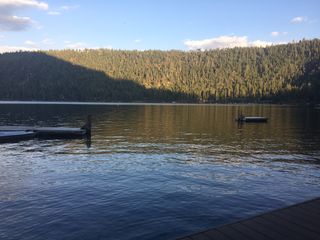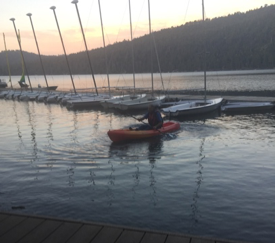In 1940, Thomas Wolfe wrote a novel entitled, You Can't Go Home Again, in which the main character says:
"You can't go back home to your family, back home to your childhood...back home to a young man's dreams of glory and of fame...back home to places in the country, back home to the old forms and systems of things which once seemed everlasting but which are changing all the time – back home to the escapes of Time and Memory."
While I don't want to get into a literary argument with Mr. Wolfe, let me say that I disagree with the premise. If going home again means that you can’t return to a place at another time, and find everything exactly the same, then perhaps he was right. However, not if one approaches life in a more optimistic way and understands that while some things may change, some things remain the same, and some things might be even better.
When my youngest daughter turned three, and her older brother was four-and-a-half, we first began going to a Family Camp at Fallen Leaf Lake in Northern California. The camp consists of approximately 52 cabins, from one to three rooms, respectively holding 2-10 people, and a Lodge with 12 single rooms. There was a large dining hall with three gargantuan meals served per day, and wine and beer available for purchase at dinner. The staff consisted of a few older adults, but mainly undergraduate students with enormous amounts of creativity, energy, and irreverence.
Children were assigned to groups based upon their age with such names as Munchkins, Snoopers, and Menahunies. Each group was led by two or more students who engaged the children in a variety of activities ranging from swimming, boating, hikes, art projects, and games. As a result, we adults were able to do whatever we wanted, including some of the same activities that our children were engaged in but different; a five hour hike up to find a hidden waterfall carrying our own lunches and water, for example.
There were also art projects for the parents; again, led by incredibly talented and creative students. There were beach parties, cookouts, barbecues, tennis tournaments and the like while two evenings during the week, selected faculty gave presentations. Overall, the days were filled, and at the various meals which were served buffet style at large tables, we were able to meet new people, some of whom became friends, some of whom did not.
Cabins were sparse but adequate. Each and every one had a porch which meant we could go out and look at the incredible views of the lake and mountains, meet and kibbitz with our neighbors, and do a lot of things, or simply do nothing. The lake was cold, sometimes very cold, but our children didn't seem to mind, and being in our late 30s and early 40s, neither did we.

There was no television, except for one year when we were there during the Olympics, when a single television was brought into a large conference room so we could see the competition. This was before cell phones, so the pay phones in the main lobby area were used as needed. There were no phones in the individual cabins or rooms, and while newspapers were available for purchase during our stay, they were usually a day late. So, in some sense, we were totally in ‘the here and now’ and fully committed to our partners, our new and returning friendships, our children, and being in a beautiful rustic environment.
We went for a week every year for 15 years until our youngest daughter graduated high school, went off to college, and had other things that she wanted to do with her summers. Our lives were hectic and busy as we developed our careers, were involved in such mundane things such as buying a house, being a blended family since I had been previously married and had two older children and getting on with life.
I suspect that many of the readers of this blog have had similar experiences with their children where they returned to favorite places on a regular basis, and only stopped when children grew up. But even if you didn't, I’m certain that there were some special times in some special places that you yearned to re-experience but were afraid it might not be the same.
Fast forward 20 years and things have changed. Our youngest daughter is now in her mid-30s. Our youngest son is now in his late 30s and has recently married and is talking about having children.
How about returning to camp?
Great idea!
Go online.
Oops – It's not as easy as we thought. Lots of other people who had been yearly devotees are wanting to go back to camp and there is a waiting list.
Five years later, we finally make it off the waitlist but only for the last week which is totally devoted to families with babies and very young children. At that point, we have a granddaughter who is three years old, the same age as when we first began going to camp with our youngest daughter. We asked our youngest son if he was interested in going back to camp with his three-year-old daughter and we asked our youngest daughter if she was interested in coming back to camp again.
Wahoo!
They both said yes with a few caveats about when they would be arriving and when they would be departing which then allowed us to also invite other family members who had previously been at the camp in the good old days.
So now what?
Previously, we could fly to the South Lake Tahoe airport and either rent a car or be picked up by camp buses and in an hour, be at the camp. Now, we had to fly to Reno from three different places, San Diego, Indianapolis, Indiana, and Los Angeles, coordinate arrival times, rental cars, and then face a three-hour ride to camp. Not terrible, but not the same. Fortunately, our three-year-old granddaughter came running off the plane with her father smiling, bouncing, and saying, "When do we get to camp?” Just a few hours later, we arrived, and you know what?
It was the same.
It was different.

Perhaps what was most important was what I had forgotten, and what was the same:
- How quiet it was when I was outdoors and a 15-minute walk from the main Lodge.
- How beautiful it was as I looked over the lake that I had gazed at many, many times before.
- How many things came back – not so much memories, but feelings, and I found myself tearing up.
- How the student staff and counselors were the same, but not the same. In conversations, they seemed older and wiser than the students were 30 years ago.
So, after we checked in, and ordered newspapers for the week (and they would be coming the same day), we walked up to our cabin. I hadn't realized how hilly the campsite was, and even though we were fortunate enough to get a cabin close to the main lodge and dining room, it was hard to walk up that hill and up two flights of stairs. It didn't seem that way then, but it sure seemed that way now.
Inside the cabin, everything was the same, but different. Still no phones which was good. The rooms had been spiffed up, but not changed. The shower, bathtub, toilet, and sink were new and nicer, and our room keys and name tags now hung on a metal chain, rather than the lanyards that I remembered. The shutters did a better job of keeping out the light. There were lots of plugs, not just one, so that we could charge our laptops, iPads, smart phones. And, the camp had Wi-Fi – both a blessing and a curse.
So, I could stay connected with the outside world, receive and send emails texts, and even talk by phone.
Wasn't that great!
Wasn't that awful!
Wasn't it convenient!
Wasn't it intrusive!
I also found out, but not until the last day, there was actually a computer center with five machines, a printer, and all of that stuff that we need, love and hate, and can't be without, and wish we could and, and, and. But enough of this grousing. What was it really like to be there?
Going to dinner was the first shocker. It was pretty clear that I was one of the oldest people there, and my wife a close second. The food was abundant and varied, but clearly aimed at the tastes of the children rather than the adults – hamburgers, fried chicken, mac and cheese. Since during this last week of the season there were only small children, even though there were fewer people in total, the noise level was incredible, exhilarating, exciting, overwhelming, and deafening.
The first evening, we met someone who remembered having our daughter as a member of his group when he was a camp counselor. He turned, identified us as grandparents, said that he wished his own parents were here, and after a bit is persuading, called them up, and they arrived the next day.
Score one for the older adult generation.
So, I could focus on all of the things that I used to be able to do that I couldn't do. Then, I would waterski both morning and evening, go out on a sailboat (getting marooned when the wind dropped more than once), take 4- to 6-mile hikes without a second thought, and enter the tennis tournament (which I always lost).

Now, although I'm in excellent health, I also have a few challenges; the most important one being balance. So, no waterskiing, but kayaking. No sailing but taking the family out on a pedal boat; no five-mile runs before breakfast, but a 1-hour walk to the firehouse and beyond, with a lot of it uphill. Not worrying about eating in terms of volume, but now focusing more on salads, only one glass of wine with dinner, passing on dessert and choosing fruit instead.
As my people say, "Could be worse!"
The rest of the week went by slowly and yet blazingly fast. Birthdays were celebrated in the dining hall by students presenting the birthday boy or girl, man or woman, grandfather or grandmother, with a special cake and a happy birthday song delivered in a way that only enthusiastic undergraduate students can deliver. At one evening event, I got up and sang loudly to a whole group of kids, parents, and grandparents as part of the skit that the students were putting on. I attended a lecture and engaged the professor in a respectful but challenging way.
So, I hope you get it. If you have a chance, with deference to Mr. Wolfe, for goodness sake, GO HOME AGAIN.
And when you do, go with an open mind, and an open heart, and don't be eager to point out all the things that have changed for the worst. In an earlier blog entitled How to Not Be a Grumpy Old Man, or Woman (hyperlink), I pointed out that it was very easy to see things through a negative prism and complain. When I gave a talk to a group of retired executives about this topic, one gentleman got up and said:
"And no more too’s!: It's too cold! It's too noisy! It's too crowded! It's too dark! It’s too stuffy!"
Enjoy every new experience, taste every food you've never tried before, engage with your peers, with your children, with everyone who's there to make your experience more interesting, and more challenging.
Savor the moments!




